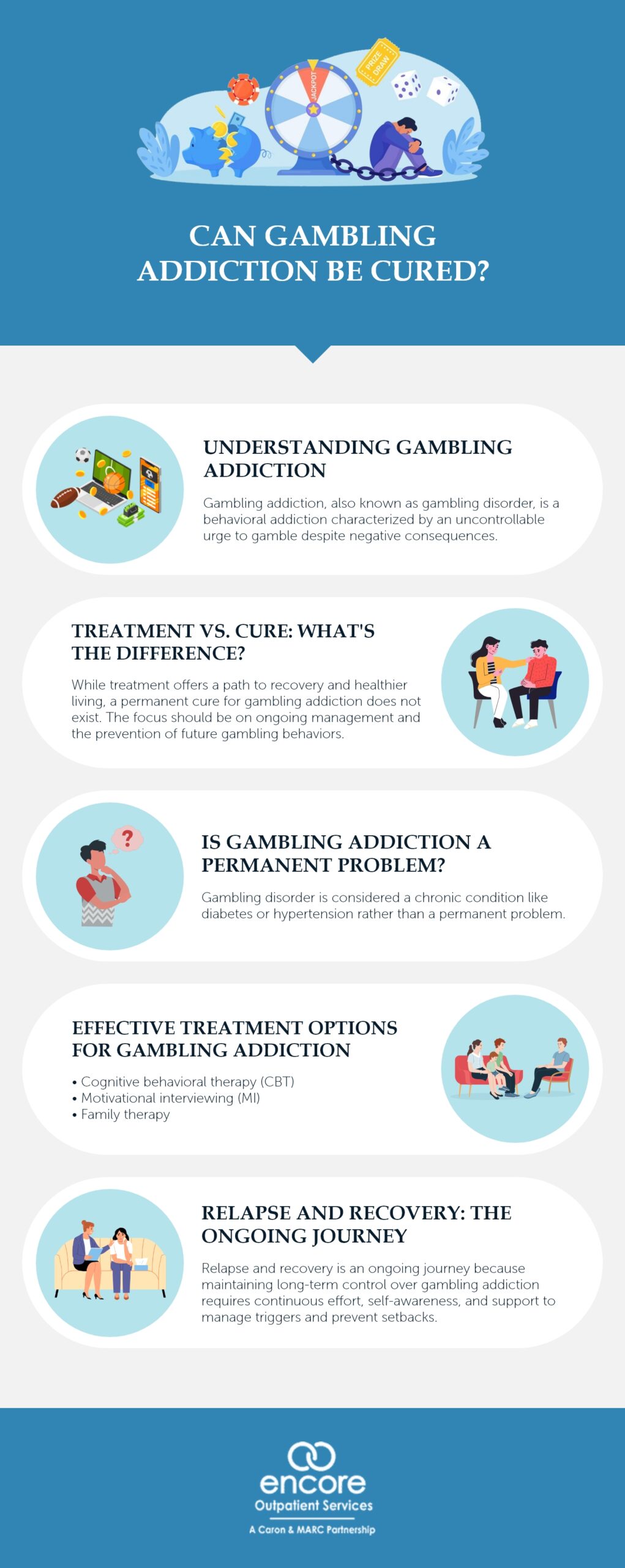No, gambling addiction cannot be “cured” in the traditional sense, but it can be successfully managed with professional treatment and ongoing support. Like many other behavioral addictions, gambling addiction is considered a chronic condition, which means that recovery involves managing the addiction over time rather than completely eliminating it. Through various treatment options, such as therapy, support groups, and lifestyle changes, individuals can regain control of their behavior and lead healthier, more balanced lives.
Understanding Gambling Addiction
Gambling addiction, also known as gambling disorder, is a behavioral addiction characterized by an uncontrollable urge to gamble despite negative consequences. It shares many similarities with substance use disorders, such as the inability to stop, the development of tolerance, and the experience of withdrawal symptoms when attempting to quit. Those with gambling addiction often experience significant disruptions in their personal, social, and financial lives.
A combination of biological, psychological, and environmental factors influences the condition. It affects the brain’s reward system, triggering the release of dopamine and reinforcing the compulsion to continue gambling. Over time, individuals may feel compelled to gamble more frequently or with higher stakes to achieve the same level of excitement, much like the development of tolerance seen in substance use disorders.
Early recognition and intervention are crucial for managing the condition, as gambling addiction is chronic and progressive, meaning it can worsen without treatment.

Treatment vs. Cure: What’s the Difference?
The key distinction between treatment and cure lies in their goals and long-term effects. Treatment for gambling addiction focuses on managing the condition and helping individuals regain control over their behavior. Treatment aims to reduce the harmful impact of gambling addiction, improve mental health, and provide coping strategies to prevent relapse. A cure, on the other hand, implies the complete elimination of the addiction, meaning that the individual would no longer experience urges or the potential for relapse.
While treatment offers a path to recovery and healthier living, a permanent cure for gambling addiction does not exist. The focus should be on ongoing management and the prevention of future gambling behaviors rather than the complete eradication of the addiction.
Is Gambling Addiction a Permanent Problem?
Gambling disorder is considered a chronic condition rather than a permanent problem. Like other chronic disorders, such as diabetes or hypertension, compulsive gambling habits can persist throughout a person’s life, with periods of remission and relapse. While individuals may experience times when their symptoms subside and they regain control over their gambling behavior, this does not indicate that the problem has been permanently resolved. Relapses are common, and managing the addiction typically requires continuous effort and support. By working with mental health professionals and engaging in treatment, individuals can achieve significant improvements in their behavior and quality of life.
Effective Treatment Options for Gambling Addiction
Gambling addiction is a treatable condition, and several evidence-based therapies have been proven effective in helping individuals regain control over their behaviors. Here are key treatment options:
- Cognitive Behavioral Therapy (CBT): CBT is widely recognized as one of the most effective treatments for gambling addiction. It helps individuals identify the thought patterns and triggers that lead to gambling, replacing them with healthier coping mechanisms. CBT also enhances problem-solving skills and addresses the emotional issues that may contribute to compulsive gambling, making it highly effective in reducing the risk of relapse.
- Motivational Interviewing (MI): MI is a client-centered approach designed to help individuals resolve ambivalence about quitting gambling activities. It encourages individuals to explore their values, goals, and the negative consequences of their gambling habits, motivating them to commit to change. This approach can be especially helpful for those who may not initially recognize the severity of their addiction.
- Support Groups: Peer support groups such as Gamblers Anonymous (GA) provide a safe and non-judgmental space where individuals can share their experiences, receive encouragement, and hold themselves accountable. GA, modeled after the 12-step program of Alcoholics Anonymous, emphasizes mutual support and accountability, which are crucial for sustaining long-term recovery.
- Family Therapy: Family therapy can be an essential part of treatment, as gambling addiction often affects relationships. By improving communication, rebuilding trust, and addressing relationship dynamics, family therapy fosters a supportive environment that can enhance your recovery journey. It’s particularly useful for healing the emotional toll gambling has on both the individual and their loved ones.
- Financial Counseling: Since gambling addiction frequently leads to financial difficulties, financial counseling is a vital part of recovery. Financial counselors work with individuals to create realistic budgets, manage gambling debt, and develop strategies to prevent future gambling-related financial crises. This service helps individuals regain control over their finances and reduces the stress that might fuel gambling urges.
- Lifestyle Changes: Adopting lifestyle changes is another effective strategy for enhancing recovery. Engaging in regular physical activity, establishing a daily routine, and developing new hobbies can help reduce idle time and minimize gambling triggers. These positive lifestyle changes contribute to emotional well-being and long-term recovery.
- Inpatient and Outpatient Programs: For severe cases of gambling addiction, intensive treatment options such as inpatient programs, partial hospitalization programs (PHP), or intensive outpatient programs (IOP) offer comprehensive care. These programs provide structured therapy sessions, group counseling, and individualized support, ensuring that individuals receive the tailored treatment they need to regain control of their behavior.
By combining these treatment approaches, individuals can address both the psychological and behavioral aspects of gambling addiction. While gambling addiction may not have a “cure,” effective management and long-term control over behavior are achievable. With the right treatment, support, and commitment, individuals can regain control of their lives and avoid the harmful consequences of gambling addiction.
Why Does Gambling Disorder Have a High Relapse Rate?
Relapse is a frequent challenge for those recovering from a gambling disorder, with many factors contributing to the difficulty of maintaining long-term abstinence. Research, including a five-year follow-up study, found that 38 out of 87 individuals recovering from gambling disorder experienced a relapse. This reflects the complexity of gambling addiction and the obstacles that make sustained recovery challenging.
Several risk factors contribute to relapses, including:
- Emotional Triggers: Emotional distress, such as stress or feelings of boredom, can be a significant contributor to relapse. Individuals with gambling addiction often use gambling as a coping mechanism for negative emotions. Without proper emotional regulation skills or healthy alternatives to managing stress, these triggers can lead to a return to gambling.
- Social Pressures: Being in social environments where gambling is normalized or encouraged can heighten the risk of relapse. Peer pressure or the desire to engage in social activities involving gambling, such as sports betting or casino visits, can be particularly tempting for those in recovery. The pervasive nature of gambling, especially in social circles, creates additional challenges for individuals trying to maintain abstinence.
- Lack of Support: While support groups like Gamblers Anonymous can provide essential resources, maintaining total abstinence can be difficult. Studies indicate that only 8% of GA members remain fully abstinent after one year, and this number decreases slightly to 7% after two years. A strong, continuous support system is crucial in maintaining recovery.
- Overconfidence: Some individuals may develop a false sense of control after periods of abstinence, leading them to believe they can gamble without falling back into addiction. This overconfidence can cause them to test their limits, resulting in a relapse when their behavior escalates back to unhealthy levels.
- Environmental Cues: Being in familiar environments associated with previous gambling behavior can act as powerful triggers. These high-risk situations may evoke memories of past gambling successes, stimulating cravings and making it difficult to resist the urge to gamble again.
- Lack of Continued Motivation: Over time, individuals may lose interest in engaging with ongoing recovery efforts, such as therapy sessions or support group meetings. As participation declines, they are more likely to experience a relapse because these activities are essential in reinforcing positive behavior and strategies to combat addiction.
- Co-Occurring Substance Use Disorders: Individuals with co-occurring disorders, such as alcohol or drug dependence, face a heightened risk of relapse. The interplay between gambling and substance use can create a vicious cycle, where one addiction fuels the other, complicating efforts to recover from both.
- Mental Health Disorders: Those with underlying mental health conditions, such as anxiety or depression, are at greater risk of relapse. These disorders often exacerbate the emotional turmoil that leads to gambling, making sustained recovery more difficult. Treatment of co-occurring mental health conditions is essential to improve outcomes for individuals in recovery from gambling addiction.
While relapse is common, understanding these influencing factors can help individuals and their support systems implement strategies to reduce the risk and promote long-term recovery.
Relapse and Recovery: The Ongoing Journey
Recovery from gambling addiction is an ongoing process that involves both progress and setbacks. Relapse is common, with many individuals experiencing periods where they struggle to maintain abstinence despite their best efforts. However, relapses are not signs of failure; they are part of the recovery journey, providing opportunities to learn and strengthen coping mechanisms.
While recovery is not a linear process, each step forward builds resilience. The goal is long-term management, allowing individuals to regain control of their lives, minimize the risk of relapse, and live in a way that supports lasting change.
Can Gambling Addiction Be Prevented?
While preventing gambling addiction entirely may be challenging, there are several strategies that can help reduce the risk. Education plays a critical role in prevention by raising awareness about the negative impacts of gambling, particularly among vulnerable populations like adolescents and young adults. Understanding the risks associated with gambling and recognizing the early warning signs of gambling addiction can help individuals make informed decisions and avoid developing problematic behaviors.
If you or a loved one is struggling with gambling addiction, Encore Outpatient Services in Arlington, VA, is here to provide comprehensive, personalized support. With evidence-based treatment options, including cognitive behavioral therapy, family therapy, and specialized outpatient treatments, Encore helps individuals regain control of their lives and work toward lasting recovery. Reach out to Encore today and take the first step toward a healthier and happier life.
